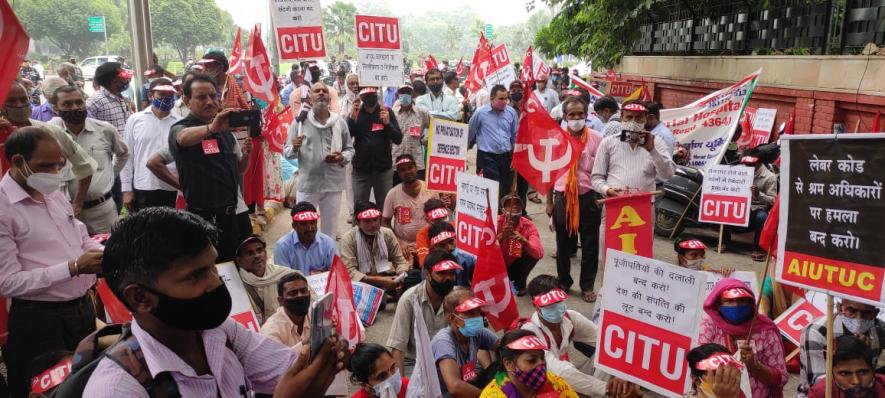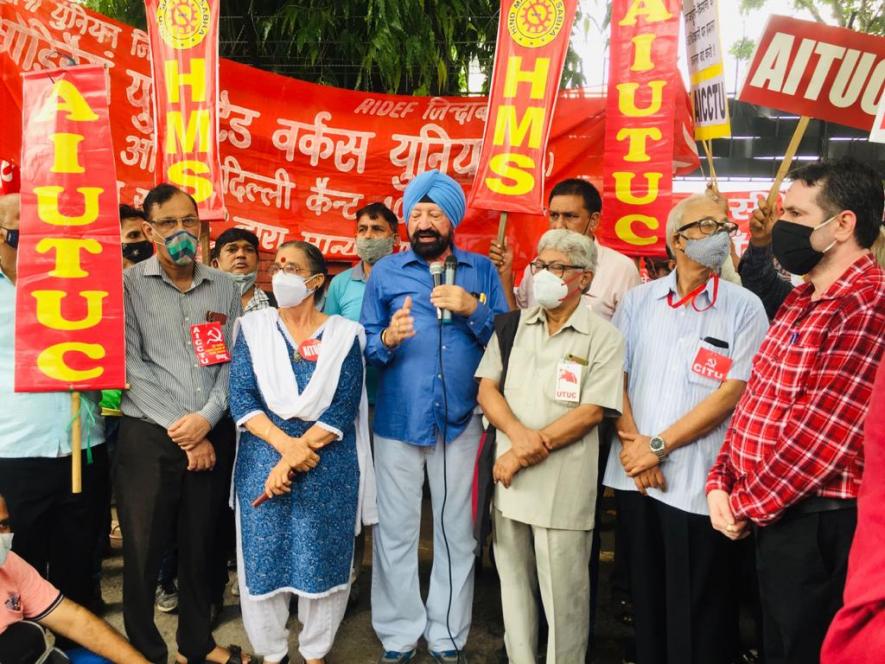‘Save India’ Campaign Takes on Different Meanings at Delhi Protest

A demonstration was staged at Mandi House in New Delhi as part of the 'Save India' campaign. Image clicked by Dipesh
Pratima Das, a domestic worker by profession, had to lie to her employer about where she was headed this morning. “I told maalkin that I am going to meet my relatives,” the 32-year-old said, grinning.
Standing at a distance, 50-year-old Virendra Sharma's story was no different. “I took an off today for which I’ll lose a day's wages,” the safai karamchari employed by the civic body in the national capital on contract, told Newsclick.
Both Das and Sharma were among hundreds of working people who gathered on Monday at New Delhi’s Mandi House to join a protest march to ‘Save India’ from the Narendra Modi–led Central Government and its “draconian” policies. The march to Parliament as planned, however, was not allowed by the Delhi Police.
The protest was organised by the ten central trade unions as part of a nationwide call that saw participation from numerous sectors, including government employees, factory workers, informal workers and farmers, among others. The working classes gathered in an attempt to bring to the fore issues that were upsetting them; their stories revealed a not-so-hidden plight and a sense of anger which has been simmering for long.
As a result, the slogan ‘Save India’ took on varied meanings for different protesters.
“Life has turned upside-down after the COVID-19 pandemic,” Das told Newsclick, explaining that she was working half the number of households she did earlier. This was corroborated by others accompanying Das, who were all present at Mandi House on Monday under the banner of the Self Employed Women’s Association's (SEWA) Delhi unit.
Suman Rai, local organiser, SEWA Delhi, said that women street vendors, home-based workers, and domestic workers were present all day to protest, demanding a single thing: recognition of their labour. “These women are demanding that they be registered so that their work is recognised and they can receive some social security. If we want to 'Save India' from the upcoming pandemics, then these workers must be protected first,” she said.
Sharma, the safai karamchari at a north-Delhi neighbourhood for close to 11 years, agreed. “We work for up to 12 hours everyday and yet we don’t make enough for our families,” the member of the Hind Mazdoor Sabha (HMS) union rued, adding that some of his co-workers even lost their lives to the deadly disease since there was no provision for safety gear for contract workers.
If the COVID-19-induced challenges haunted some, others lamented the loss of employment.
Among them one was 41-year-old Manoj Kumar, who was fired along with 17 others from an electric-wire manufacturing unit in east Delhi’s Jhilmil Industrial Area last month. The company's owner chose to down shutters following restrictions on operations this year.
On Monday, all of these workers were present at Mandi House under the banner of the United Trade Union Congress (UTUC) to demand wages which have been pending for over three months. “We have been working in the factory for the last 15 to 20 years. Now, after the lockdown, the owner could shut down the unit and sit back at home. But what about us?” asked Kumar, adding: “How do I even go back, empty-handed, to my village in Bihar now?”
Pushpa, 36, lives in north-east Delhi’s Gokulpuri, and had similar grievances. A construction worker by profession, all she is able to manage these days secure work for up to 10 days in a month. “It fetches me not more than Rs 2,000 to Rs 3,000. Now you tell me if it that is enough to survive in Delhi,” the mother of two – a daughter and a son – said.
To make matters worse for construction workers like Pushpa and others – who had come under the guidance of the All India Central Council of Trade Unions (AICCTU) – most of them complained of not receiving any assistance from the construction workers’ welfare board despite being registered.

Leaders of the Central Trade Unions were present at Mandi House. Courtesy - Special Arrangement
The Aam Aadmi Party (AAP)–led Delhi government had in April this year announced a financial assistance of Rs 5,000 to be paid by the Delhi Building and Other Construction Workers Welfare Board (DBOCWWB) to its registered construction workers in the wake of the pandemic-induced shutdown.
“I don’t even have a ration card,” Savita, 30, from the same group, said in anger. A ration distribution scheme intended to benefit 20 lakh non-ration card holders in Delhi, was launched by the AAP in June.
“I received a token for ration only once; in June. After that, there was no support from the government,” Savita, who claimed to have been reeling under the pressure of soaring prices of essentials, added.
Among the participants at Mandi House in Delhi on Monday were also students and teachers groups. Pritish Menon, secretary, Students’ Federation of India (SFI), Delhi, said that students from JNU, DU and AUD had come in solidarity with workers and farmers. “We also believe that there is a need to save the nation from the draconian National Education Policy – nothing but a tool to exclude the marginalised groups from attaining good quality education,” he said
Similarly, Nandita Narain, representing the Joint Forum for Movement on Education, an umbrella group of teachers’ unions, lamented that with the “commercialisation and privatisation of the Indian education through NEP,” the service conditions of the teachers will “severely deteriorate.”
“We must save our country’s education system from this onslaught,” she said.
The nationwide call to protest was, “necessitated due to the bitter experience of the BJP-led NDA Government at the Centre since 2014 - its policies are anti-worker, anti-people, and even anti-national,” the ten Central Trade Unions said in their press statement on Monday, adding that demonstrations were observed at “more than a lakh locations throughout the country.”
The unions also issued a list of 11 demands, including the scrapping of the “Labour Codes and anti-people Farm Laws and Electricity Amendment Bill”; ensuring of MSP for food procurement; rolling back of high prices of essential commodities; registering all migrant and unorganised sector workers and creation of jobs and the filling up of government vacancies, among others.
Amarjeet Kaur, general secretary, All India Trade Union Congress (AITUC), told Newsclick that there was a 14-point demand charter that the trade unions and farmers’ bodies were pressing for with today’s protest.
Tapan Sen, general secretary, Centre of Indian Trade Unions (CITU), who was present at Mandi House told Newsclick that the aim of the ‘Save India’ protest was to drive down the message that if the working people’s livelihoods “perished”, then “there will be nothing left in this country.” “In a situation when that is not being done then our slogan inevitably becomes 'Desh Bachao, Modi Hatao'.”
A similar notion was shared by Jagdish Prasad, a security guard by profession, who has lived in Delhi for 40 years now. “The government is diluting the labour laws to benefit the employers,” said the CITU member. Prasad told Newsclick that if that happened then the “over-exploitation of the workers was inevitable. Aur jab mazdoor ke hit ke kaanoon hi nahi bachenge, toh mazdoor kaise bachega. Aur jab mazdoor nahi bachega, toh desh kaise bachega?,” he reasoned.
Get the latest reports & analysis with people's perspective on Protests, movements & deep analytical videos, discussions of the current affairs in your Telegram app. Subscribe to NewsClick's Telegram channel & get Real-Time updates on stories, as they get published on our website.























